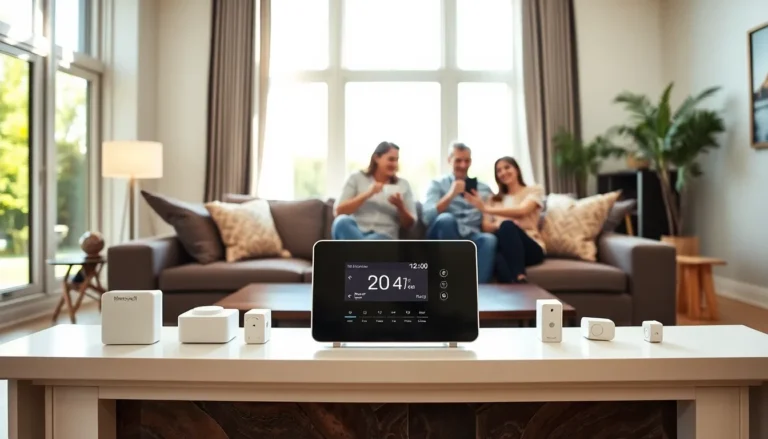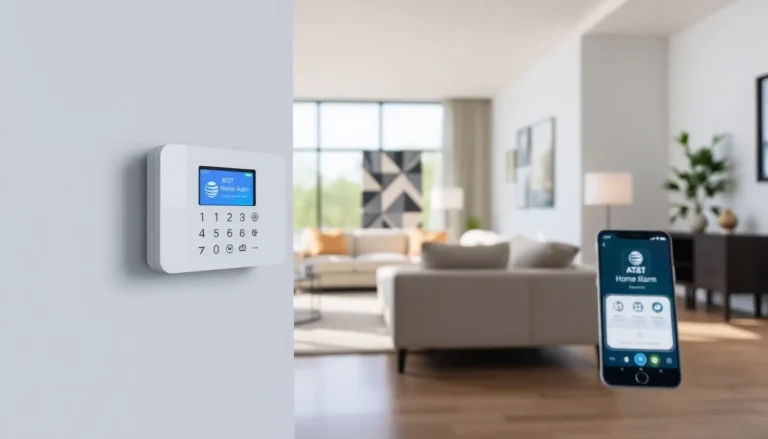Table of Contents
ToggleIn a world where home security is more crucial than ever, the unsung hero of your alarm system often goes unnoticed: the battery. Imagine your alarm blaring at 3 AM, only to find out it’s as powerless as a cat in a dog park. That’s right; a dead battery can turn your peace of mind into a panic attack faster than you can say “who forgot to check the batteries?”
Keeping your home safe shouldn’t feel like a high-stakes game of hide and seek. With the right home alarm battery, you can ensure your security system stays vigilant, ready to protect what matters most. Let’s dive into the world of home alarm batteries, where a little knowledge can save you from a lot of unnecessary stress—and maybe even a few late-night surprises.
What Is a Home Alarm Battery?
A home alarm battery serves as the power source for security systems, ensuring they operate continuously. This battery type typically uses lithium or alkaline technology, providing backup power in case of outages. Home alarm systems rely on batteries to maintain functionality, allowing alarms to sound even when electricity is lost.
Different models exist, with each designed to fit specific systems, offering a range of lifespans. For example, batteries may last from three to five years, depending on usage and quality. Regular testing helps maintain performance, with checks recommended at least twice a year.
Batteries also vary in size, with options such as AA, 9V, and rechargeable formats available. Specific alarm systems might require proprietary battery types, making it crucial to consult the manufacturer’s guidelines. Identifying the proper battery ensures optimal performance and reliability.
Replacing expired batteries promptly prevents false alarms, a common issue caused by low power. Consumers benefit from keeping spare batteries on hand for emergencies. Understanding the role and specifications of home alarm batteries can enhance overall security effectiveness.
Importance of Home Alarm Batteries

Home alarm batteries play an essential role in ensuring security systems function effectively. Without a reliable power source, alarms cannot activate, compromising safety.
Reliability and Safety
A dependable battery guarantees that alarms operate during emergencies. Homeowners should prioritize battery checks to avoid scenarios where a dead battery leads to system failure. Regular maintenance significantly enhances safety; testing batteries twice a year confirms their functionality. Many systems depend on a reliable power source to operate efficiently. Moreover, expired batteries can result in false alarms, causing unnecessary stress and confusion.
Cost-Effectiveness
Investing in high-quality home alarm batteries proves cost-effective over time. Replacement costs for batteries are minimal compared to potential losses during a break-in. A functioning alarm system deters intruders, leading to lower homeowner insurance premiums. Additionally, battery lifespans typically range from three to five years, making regular replacements predictable and manageable. Stocking spare batteries further minimizes the chances of encountering unexpected expenses related to security lapses. Understanding the importance of battery maintenance supports long-term savings.
Types of Home Alarm Batteries
Understanding the different types of home alarm batteries helps ensure reliable security. Two primary categories include rechargeable and non-rechargeable batteries.
Rechargeable Batteries
Rechargeable batteries provide a cost-effective option for home alarm systems. Lithium-ion and nickel-metal hydride batteries serve as common types, allowing for repeated use after charging. Lifespans typically extend from three to five years, similar to non-rechargeable counterparts. Maintaining these batteries involves regular charging to keep them operating efficiently. Users benefit from reduced waste, as they can recharge multiple times. For safety, checking manufacturer guidelines regarding compatible charger types is crucial.
Non-Rechargeable Batteries
Non-rechargeable batteries, such as alkaline and lithium types, offer reliability for home alarm systems. Lifespan averages around three to five years, but performance can vary based on usage and environmental conditions. Battery sizes like AA and 9V are typically used in various models. Once depleted, these batteries require immediate replacement to prevent system failure. Storing spares ensures that users can quickly replace them when necessary. User-friendly and often more affordable upfront, these batteries suit many homeowners’ needs.
Choosing the Right Home Alarm Battery
Choosing the correct battery for a home alarm system ensures reliable performance and security. Several factors influence this decision.
Factors to Consider
Battery type significantly impacts performance. Lithium batteries deliver longer life and stability, while alkaline options are more readily available. Homeowners should also assess compatibility with their alarm systems. Check specifications from manufacturers to avoid incompatibility issues. Lifespan matters too; batteries typically last three to five years, so regular testing twice a year is vital. Environment plays a role as well; extreme temperatures can affect battery efficiency. Location affects how often batteries need replacement, especially in regions prone to outages. Prioritizing these factors enhances protection and maintains system integrity.
Brand Recommendations
Investing in trusted brands ensures reliability. Names like Energizer and Duracell offer high-quality alkaline batteries. For lithium options, brands such as Panasonic or Rayovac are well-regarded. Homeowners should consider models designed specifically for security systems, as these often enhance performance. While Duracell provides a solid reputation, VARTA also produces excellent rechargeable options. Check online reviews for insights into battery longevity and efficiency. Comparing prices among retailers may reveal savings on bulk purchases. These recommendations guide homeowners toward making informed choices for optimal security.
Maintenance Tips for Home Alarm Batteries
Maintaining home alarm batteries ensures reliable functionality and security. Regular attention to these components significantly enhances the safety of a home.
Regular Testing
Conduct testing at least twice a year for optimal performance. Testing verifies that the alarm system responds as expected during emergencies. Homeowners can easily perform a simple test by engaging the alarm system and observing its activation. Many modern systems include self-testing features, providing peace of mind. Keeping a calendar reminder aids in maintaining this schedule. Regular testing also helps identify weak batteries before they fail. Implementing this practice minimizes the risk of safety issues arising from battery malfunctions.
Replacement Signs
Recognizing signs of battery depletion is crucial. Homeowners should watch for warning alerts from the alarm system, often involving beeping or flashing lights. An unusually frequent need to recharge or replace batteries often indicates underlying issues. Additionally, diminished alarm response times suggest battery replacement is imminent. Batteries that show physical damage, such as leakage or corrosion, require immediate attention. Keeping spare batteries readily available allows for quick replacements when needed. Addressing these signs promptly ensures the alarm system remains operational and effective.
Maintaining home alarm batteries is essential for ensuring security systems function effectively. Regular checks and prompt replacements can prevent unexpected failures that compromise safety. Homeowners should prioritize battery selection based on compatibility and performance to enhance their security measures.
Investing in high-quality batteries and keeping spares on hand contributes to peace of mind. By following maintenance tips and being proactive about battery care, individuals can significantly improve their home security and potentially save on insurance costs. A reliable alarm system not only deters intruders but also provides a sense of safety for families.







